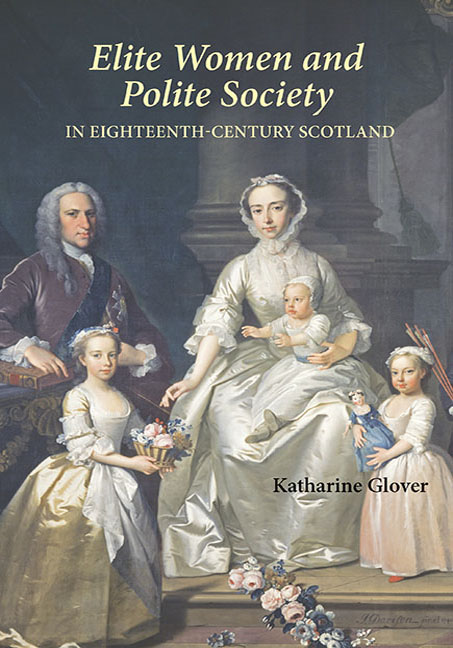Book contents
- Frontmatter
- Contenst
- Dedication
- Acknowledgements
- List of Abbreviations
- Preface
- 1 Elite Women and Eighteenth-Century Scottish Society
- 2 Education and Upbringing
- 3 Reading and Print Culture
- 4 Polite Sociability: Space and Social Practices
- 5 Politics and Influence
- 6 Travel, Tourism and Place
- Conclusion
- Appendix Biographical Backgrounds
- Bibliography
- Index
6 - Travel, Tourism and Place
Published online by Cambridge University Press: 08 April 2017
- Frontmatter
- Contenst
- Dedication
- Acknowledgements
- List of Abbreviations
- Preface
- 1 Elite Women and Eighteenth-Century Scottish Society
- 2 Education and Upbringing
- 3 Reading and Print Culture
- 4 Polite Sociability: Space and Social Practices
- 5 Politics and Influence
- 6 Travel, Tourism and Place
- Conclusion
- Appendix Biographical Backgrounds
- Bibliography
- Index
Summary
‘Removing from place to place’
‘We propose to go for Mavisbank [the Clerks’ Midlothian country house] on the 7th’, wrote Janet Clerk of Penicuik in her devotional diary in June 1748. ‘O that my removing from place to place may not hinder me in my dutie but rather stir me up.’ Writing, as was her habit, from the family house at Penicuik, she had only just arrived back from a visit to her daughter at Bonhill in the Vale of Leven, having also spent time at Luss on the shores of Loch Lomond. Later that summer, she travelled south-west to Dumcrieff near Moffat to visit her son George and his wife. What she was recording was by any standards a busy travel schedule, yet one that was by no means exceptional amongst the women of the eighteenth-century Scottish elite. As she noted, this ‘removing from place to place’ coloured other aspects of women's lives, mental as well as practical, and may be seen as one of the defining influences that demarcated elite experience. For those families keen to engage in all aspects of fashionable sociability, what might be termed conspicuous mobility had become a way of life loaded with cultural meanings. As summarised by one scholar, ‘The “polite” were … defined, to some extent, … by their mobility. Improvements in transport – better carriages, turnpike roads – allowed them to move with relative ease from country house to country house, from spa to spa, to race meetings and assemblies.’ Full participation in the polite world necessitated mobility for women.
Scholars of eighteenth-century travel have been perhaps surprisingly reluctant to consider the multiple connotations of ‘travel’ beyond the very self-conscious act of tourism, tending to focus on the grand narratives of the masculinity and classicism of the Grand Tour, or the aesthetic pleasures of the ‘search for the picturesque’. However, recent work by Katherine Turner on the increasing numbers of middle-rank travellers, and particularly women, whose narratives began to emerge around the middle of the century, has shown that travel held other, more diverse meanings. This chapter argues that an examination of travel's various meanings is necessary to any attempt to understand the ways in which elite women interacted with the society in which they lived.
- Type
- Chapter
- Information
- Elite Women and Polite Society in Eighteenth-Century Scotland , pp. 139 - 165Publisher: Boydell & BrewerPrint publication year: 2011

